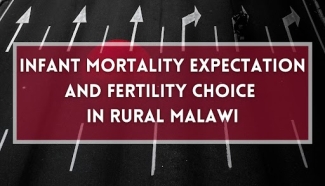
The research uses data from the Malawi Longitudinal Study of Families and Health to examine the relationship between mortality and fertility in Malawi - specifically the impact of individual-specific subjective mortality expectations on fertility choice.
Authors: Adeline Delavande, Hans-Peter Kohler, and Ali Vergili
Abstract:
For decades, population research has been interested in the complex relationship between child mortality and fertility, with a key focus on identifying replacement behavior (fertility response to experienced child mortality) and hoarding behavior (fertility response to expected child mortality). Using unique data from the Malawi Longitudinal Study of Families and Health (MLSFH), we investigate the impact of individual-specific subjective infant mortality expectations on fertility choice. We instrument the potentially endogenous infant mortality expectations with the average of parents’ ratings of children’s health to address a potentially omitted variable bias such as parental taste for health. Consistent with the hoarding mechanism, we find that a 10 percentage point decrease in infant mortality expectations leads to a 14 percentage point decrease in the propensity to have a child in the next 2 years from a baseline propensity of 43%.
Citation:
Delavande, Adeline, Hans-Peter Kohler and Ali Vergili. 2024. “Infant Mortality Expectation and Fertility Choice in Rural Malawi.” University of Pennsylvania Population Center Working Paper (PSC/PARC)